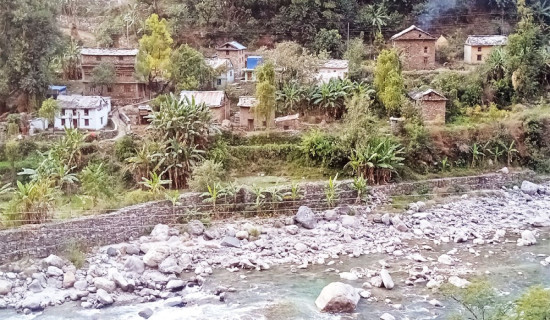- Wednesday, 4 February 2026
Curb Arable Land Abandonment
Nepal is still an agrarian country although the number of people involved in agriculture and allied activities is gradually decreasing. Agriculture and allied activities are the main sources of livelihoods of around 60 per cent of the total population. It contributes around 24 per cent to the gross domestic product of the country. Out of the total cultivable land, over 30 per cent of the land is reported to have been left fallow. The trend of abandoning arable land is increasing, which cannot be considered good from an agrarian perspective.
Until the 1990s, there was a law granting tenants partial ownership of the land they were working on, called mohiyani hak. The law has since been repealed. Still, landowners prefer to keep their land fallow rather than let the tenants work on it. They fear that dual ownership of the land may be restored given political instability and the differing views on land ownership among the political parties and leaders.
Fallow land
It is believed that 25 per cent of the farmers have no land. The rich farmers do not till the land; they live in cities. They fear that letting the landless farmers till their land may land them in the soup. The tillers may acquire the land they are tilling for free. That is why they leave their land fallow rather than let the landless farmers till the land. There is an ever-growing trend among the rural people of migrating to big cities of the country or abroad for employment. As such, they are forced to leave their land fallow. The government time and again issues notices threatening to take action on those who leave their land fallow. But the government has failed to create an environment for those having land to stay back and engage in agricultural activities.
In the first place, the farmers have to depend on rainfall. Irrigation facilities are not adequate in the country. There is no timely availability of chemical fertilizer and improved seeds. The methods of farming are based on traditional knowledge. Moreover, lack of market access is a big challenge. The agricultural products produced in the rural and remote areas are left to rot away for lack of market access. The government imports huge quantities of agricultural products from India and other neighbouring countries but does not deem it necessary to transport the products of indigenous origin to where they are needed. In fact, the country has been made dependent on foreign countries for agricultural products.
Leaving land fallow for a long time may invite several problems. The ecosystem may be imperiled and agro-biodiversity may be roiled. There may also arise food insecurity. Soil fertility may be affected. Soil erosion may increase. Invasive plants may cover the abandoned land. It may also hamper the attainment of the Sustainable Development Goals (SDGs) relating to poverty alleviation and undernourishment reduction. As per the relevant SDGs, poverty is to be reduced to less than five per cent, and undernourishment to less than three per cent by 2030. Arable land abandonment has emerged all over the country. While the country has to import agricultural products from foreign countries, the government has not paid adequate attention to developing the agricultural sector. The government needs to take measures to give a short-in-the-arm to agriculture.
The government should reassure the landlords that they can allow their land to be tilled by the landless farmers for several years and that the farmers will never be allowed to acquire the land. Allowing the farmers to till the land for one or two years is not enough. They do not want to harvest one or two batches of agricultural products by multiple batches. The government can also make leasing arrangements whereby the landlords can lease their land to those who want to till the land. Further, the government can mobilise the fallow lands and begin collective farming. Those who are forced to leave their land fallow may happily agree to this arrangement. Instead of leaving their land fallow, they can earn some money by leasing out their land to the government.
If lease-based farming can be boosted, both agricultural production and productivity can be increased. However, to materialise this, the government has to build some infrastructure. Farming inputs such as chemical fertilisers and improved seeds and machinery need to be in place. Irrigation facilities should be made available all over the country. While constructing irrigation projects, caution needs to be taken so that they will not meet the fate of the Sitka Irrigation Project. Further, agricultural roads need to be developed. The country has to import large quantities of agricultural products.
Road network
On the one hand, the country has to spend much on imports, while on the other the native farmers are not in a position to supply their products to cities and other places. So road networks are a must to facilitate market access. When there is development of the agricultural sector, employment opportunities increase. This may discourage foreign migration for employment. Nowadays, around 2,000 people go abroad for employment on a daily basis. With the use of indigenous products, imports may be drastically reduced. If anything, surplus products can be exported. It may be noted that the country used to export rice and other products to foreign countries in the past.
It may be noted that the development of the agriculture sector will give an impetus to the development of the industrial sector. This may also reduce the trade deficit to a certain extent. What is more, the past glory of the country as a predominantly agricultural country can also be restored. It is high time the government took concrete measures in consultation with agricultural experts and stakeholders so as to discourage the trend of abandoning arable land.
(Maharjan has been regularly writing on contemporary issues for this daily since 2000.)

















